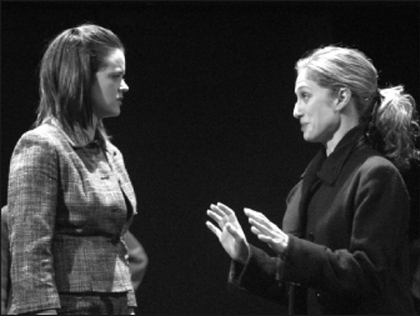By Adrienne Urbanski
Onstage, justice is sung with a rock ’n’ roll band
Before opening the KGB Bar, Denis Woychuk spent a decade defending the criminally insane, taking on pro bono clients. One of his most challenging cases involved an East Village man accused of dismembering his girlfriend. Although a body was never found, local legend has it that he boiled her into a soup that he served to the homeless. After leaving law, Woychuk penned a memoir entitled “Attorney of the Damned,” which recounts the most bizarre cases he encountered during his career.
After deciding to adapt the material for the stage, Woychuk saw humor in his experiences with the homicidal. He transformed his stories into a rousing comedic rock musical in the tradition of “The Rocky Horror Picture Show.” Composed by Rob McCulloch, the catchy rock numbers reflect the downfalls and loopholes of the legal system.
In Woychuk’s fictionalized version of events, he is replaced by a young female attorney named Skyhorse (played with earnest by Alison Johnson), who, after a depressing year of defending corporate giants, begs to take on the cases of the mentally ill. Subsequently, Skyhorse finds herself equally depressed by the realization that she now defends murderers and child rapists. “Have you ever thought one way, changed your mind the next day?” she sings in a Blondie-esque tune, by far the stand-out of the show’s repertoire.
Vancussy (Juliana Smith), a sexy, rival district attorney whose red lace bra slips out of her suit, battles Skyhorse’s sweet naiveté with jaded quips. While Skyhorse initially seems to be the play’s hero—the lone character with a pure heart—Vancussy repeatedly makes her case directly to the audience, asking, “What makes a hero? The most songs? The most lines?” Despite her corrupted spirit and boundary-less sexuality, Vancussy eventually wins the audience’s adoration, and there is no true hero of the work.
Both Skyhorse and Vancussy rely on overly confident prison shrink Blake (Ray Fisher) to adequately argue their cases. The muscled, often shirtless doctor has a sexual past with Vancussy, though his eye has now wandered to Skyhorse.
Woychuk’s real-life run-ins with the insane are reflected in the characters standing trial. Cooke (Denny Blake) is accused of murdering his girlfriend, though the only evidence is a severed finger. He croons, “Wore her finger on a chain around my neck/I know it’s romantic but what the heck/I’m sentimental.” On trial for pedophilia, Sixx (Patrick Mattingly) is a lumbering man whose rock songs cause the stage to shake and end with his unconscious collapse. After the victim commits suicide, he’s set free. Woychuk comments on the flaws in the legal system by revealing the personal motives of the players involved within it. Blake sings a tune about a wife who never loved him while a negligent judge belts that his paycheck will never be enough to get a new wife; but he stays with the job because he likes telling other people what to do.
By far the best aspect of the play is the musical talent of every cast member, including a trio of punk style back up singers aptly named the Jurettes. The backing musicians, referred to as ‘The Damned Band,’ are better than any of the groups you’re likely to encounter during a nightly tour of the city’s bars. Here, one can expect to be charmed by expertly performed rock numbers.
During the second half of the play, however, the plot becomes mired in unclear motives and absurd twists. The charm of the musical numbers, combined with the sheer energy of the performers make the play worthwhile. To assuage any lingering doubts, the ticket includes a free drink at the bar, where you might be lucky enough to spot Woychuk himself.




































